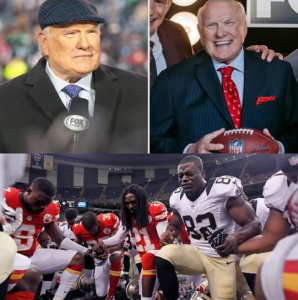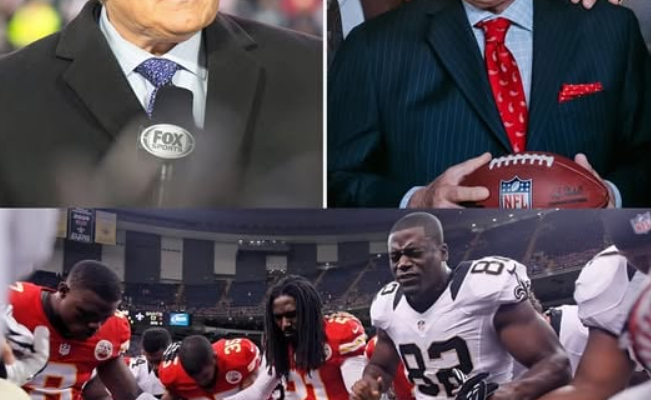
“The Last Audible: Terry Bradshaw and the Grace of Slowing Down”
There’s a kind of sadness that doesn’t come with headlines or breaking news—it arrives quietly, like a quarterback walking off the field one last time, not because he’s been tackled, but because he knows the game is changing. That’s the kind of sadness surrounding Terry Bradshaw today.
At 76, Bradshaw remains a towering figure in American football lore. Four Super Bowl rings. A league MVP. A Hall of Fame induction. And for three decades, a voice that echoed through living rooms every Sunday, equal parts grit and grin. But now, the man who once hurled touchdowns with cannon-like precision is facing a different kind of opponent: time.
Bradshaw recently shared that he can no longer run or play with his grandkids the way he used to. “I don’t like that,” he admitted. “I’ve got grandkids to play with, horses to raise, a bucket list to fill.” These aren’t just words—they’re a quiet surrender to the reality that even legends grow old.
He’s battled cancer twice. He’s dealt with lingering injuries from his 14-season career with the Pittsburgh Steelers. And while he still appears on FOX NFL Sunday, fans have noticed the tremors in his hands, the slower cadence in his speech, the weariness behind the jokes. Some have called for his retirement. Others have worried aloud. But Bradshaw, ever the showman, responded with characteristic mischief: “I told Fox, ‘If I could just die on the show, think about the ratings, right?’”
It’s a line that startles. It’s meant to. But beneath the humor is a deeper truth: Terry Bradshaw has always understood the performance of vulnerability. He’s never hidden behind the helmet. He’s never pretended to be invincible. And now, as his body reminds him of its limits, he’s still choosing to show up—on screen, in interviews, in life.
This is not a eulogy. Bradshaw is very much alive. But it is a moment to pause. To reflect. To co-title the image of a man who once defined toughness, now leaning into tenderness.
Let’s rewind.
Born in Shreveport, Louisiana, Bradshaw was a golden boy from the start. His arm strength was legendary. His charisma, undeniable. Drafted first overall in 1970, he became the face of the Steelers’ dynasty, leading them to four Super Bowl victories in six years. He played through injuries, criticism, and the brutal physicality of the game. And when he retired in 1983, he didn’t fade—he pivoted.
Broadcasting became his second act. He brought humor, candor, and a touch of chaos to the studio. He wasn’t polished, but he was real. He laughed at himself. He cried on air. He talked about depression, about faith, about fear. He made football feel human.
And now, in this third act, Bradshaw is doing something even braver: he’s letting us see him slow down.
There’s a kind of communal witnessing that happens when public figures age in front of us. We remember them as they were—young, strong, untouchable. And then we see them as they are—older, softer, mortal. It’s disorienting. It’s humbling. But it’s also sacred.
Bradshaw’s recent health revelations invite us into that space. They ask us to reflect not just on his legacy, but on our own relationship with aging, masculinity, and vulnerability.
What does it mean when a man who once symbolized power says, “I can’t run anymore”?
What does it mean when a broadcaster jokes about dying on air—not to shock, but to remind us that even legends have limits?
It means we’re being invited into a ritual of reflection. A chance to co-title this moment not as “sad news,” but as “grace in motion.”
Bradshaw’s story is not just about football. It’s about endurance. About reinvention. About showing up, even when the body falters. It’s about choosing presence over perfection.
And it’s about legacy.
He’s still under contract with FOX until 2027. If he makes it to the next Super Bowl, he’ll be 80. “I think that’s time,” he said. But even if he steps away before then, his impact is already etched into the fabric of the sport—and into the hearts of those who grew up watching him.
So what do we do with this moment?
We honor it. We reflect. We co-title.
Some possible titles:
- “The Audible of Aging”
- “Fourth Quarter Grace”
- “Still in the Huddle”
- “The Man Behind the Mic”
Each title becomes a gesture of gratitude. A way of saying: We see you, Terry. Not just the quarterback. Not just the broadcaster. But the man.
And we thank you.
For the touchdowns. For the laughter. For the honesty. For the reminder that strength isn’t just about muscle—it’s about showing up, even when it hurts.
So here’s to Terry Bradshaw. Still standing. Still speaking. Still reminding us that the game isn’t over until the final whistle—and even then, the echoes remain.

